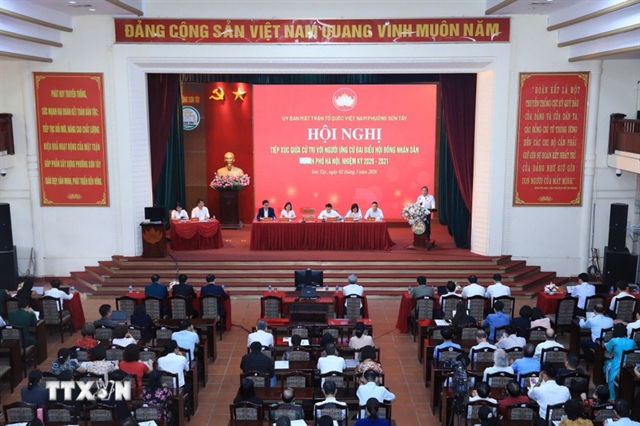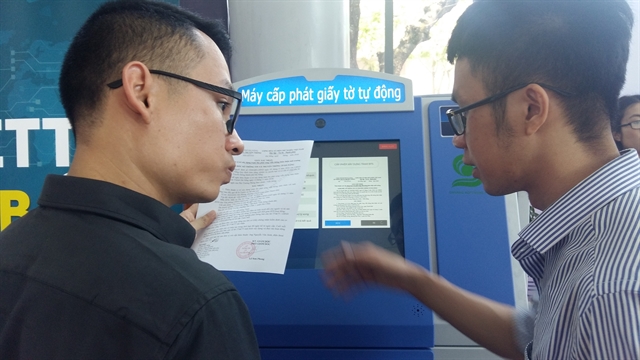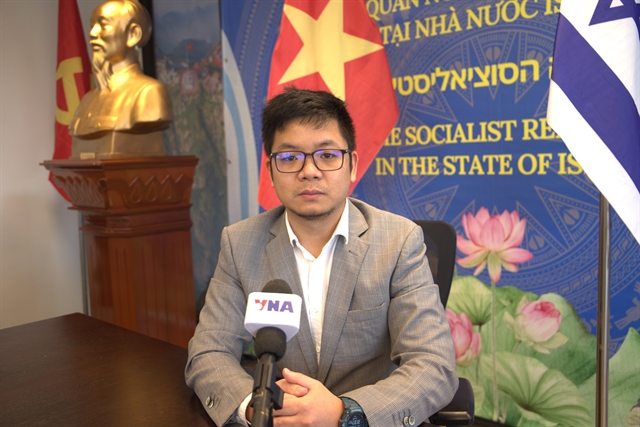 Society
Society


|
| An online application developed by an Information technology company in Đà Nẵng. The city hosted the Japan Information Communications Technology Day with the participation of 300 businesses from Japan and Việt Nam. VNS Photo Công Thành |
ĐÀ NẴNG — At least 70 per cent of Japanese businesses in Việt Nam intend to boost their investment in the country, a Japanese business representative has said.
Head of the Japan External Trade Organisation (JETRO) Hà Nội office Takeo Nakajima made the statement at the Japan Information Communications Technology (ICT) Day in Da Nang City yesterday with the participation of more than 300 Japanese and Vietnamese IT businesses.
Nakajima said the figure showed that investment in Việt Nam had brought profit and effective result for Japanese investors, and the growing information technology (IT) market in Japan was set to lure Vietnamese investors.
According to the Việt Nam software and IT service association (VINASA), 95 per cent of Japanese firms at the Japan ICT Day expressed interest in employing Vietnamese IT and software engineers working in Japan.
Nakajima added that Vietnamese businesses investing and co-operating in Japan was a new trend in IT co-operation between the two nations.
Junko Kawauchi, from Japan Information Industry Association (JISA), said Japan's IT industry was worth US$460 billion, of which $130 billion come from the software section. The demand for new technology projects in the fourth industrial revolution would increase 31.5 per cent, while Japan lacked huge human resources, he said.
“Japan has been seeking 780,000 IT engineers to fill the manpower shortage. 80 per cent of surveyed Japanese companies were ready for recruiting foreigners, and 95 per cent are interested in employing Vietnamese IT engineers,” Kawauchi said.
“However, fluent Japanese language is still the biggest challenge for Vietnamese businesses and a barrier in IT co-operation between Việt Nam and Japan.”
Junko said 20 per cent of Japanese IT businesses had employed Vietnamese IT engineers and 70 per cent of those businesses plan to keep recruiting from Việt Nam.
According to the Việt Nam software and IT service association (VINASA), three new technological sectors – digital transformation, augmented reality (AR) and virtual reality (VR) – are potential investment fields in IT co-operation between the two countries.
Meanwhile, Artificial Intelligence (AI), Internet of Things (IoT), Big Data, Japanese language training as well as business culture and market access will be major education programmes among Vietnamese investors in Japan.
Vice chairman of Đà Nẵng city’s People’s Committee Lê Trung Chinh said Japan was the largest foreign investor in the city with 177 projects worth $809 million.
He said Japan was the largest software export market among IT businesses in the city, accounting for 36 per cent, worth $46 million in 2018.
The city plans to increase the percentage of contribution by the ICT industry in Gross Regional Domestic Product (GRDP) to 10 per cent in 2030 from the current 5.5 per cent.
Sheiichi Ito, from JISA also said investing in Việt Nam was profitable as the country had advantages in manpower and low production costs.
He said most IT Japanese businesses were expecting fruitful investment from the Vietnamese market, and some of them had been working with Vietnamese partners in making products for export.
Nguyễn Tuấn Phương, Director of FPT Software Đà Nẵng, said the company earned VNĐ1 trillion ($43.4 million) revenue from software exports, of which 70 per cent from Japan, in 2018.
Phương said the company, which employs 3,600 IT engineers in Đà Nẵng, was aiming for a higher level in production for worldwide export.
He said the company had expanded its representative offices to 30 countries and teritorries.
At the Japan ICT Day, the Việt Nam-Japan Co-operation Committee and IT Innovation and Strategy Centre Okinawa signed a memorandum of understanding to expand co-operation in IT.
Đà Nẵng aims to become a smart city and the first in Việt Nam to join the ASEAN smart city network by 2030. — VNS




